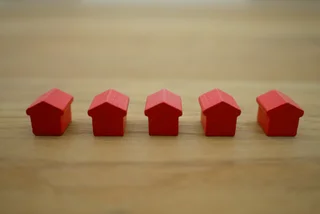There are 223,000 investment apartments in the Czech Republic owned by 71,000 people. This amounts to roughly 10 percent of all apartments in the country. The rest are used by people for their own housing.
A new study, made by research firm Dataligence in cooperation with the Rental Housing Association (AND), focused primarily on natural persons who own at least three housing units, Dataligence director Milan Roček said in a press release.
In Czechia, roughly 34,500 natural persons own at least three housing units, so together there are more than 100,000 apartments intended for rent. According to the analysis, natural persons who own two apartment units offer approximately 63,000 apartments for rent. And about 4,300 people who own apartment buildings rent out over 46,000 apartments.
Most investment apartments in Prague and Central Bohemia
Housing cooperatives own approximately 152,000 apartments in the Czech Republic. Over 300 cities own about 16,000 apartments.
According to the study, there are a total of about 4.4 million housing units in the Czech Republic. Roughly 2 million are in single-family homes, and the majority are units in apartment buildings, roughly 2.4 million. For roughly 1.9 million of them, the owners of individual apartments can be determined, the rest are registered as a whole, which is, for example, the case of housing cooperatives.
"If we look at the distribution of investment flats within the entire Czech Republic, it is not surprising that most investment flats are located in Prague and the Central Bohemian region," Roček said.
The majority of investment apartments are located in apartment buildings. In total, there are around 2.4 million apartments in Czechia, which means roughly 10 percent of apartments in apartment buildings are operated as rental investment apartments.
Municipalities no longer offering apartments
According to Roček, apartments rented by natural persons replace what the state and municipalities used to offer.
"Today, people talk about the need for rental housing, but the state has forgotten one small thing. In order to live in rental housing, someone has to offer it. Over the past 20 years, a natural supply of private investors has emerged in the Czech Republic, replacing what the municipalities got rid of during privatization and what will be difficult for us to add now," he said.
According to the study, in the last five years, the annual increase in housing units has been approximately 33,000, of which 18,000 are in family houses and 15,000 in apartment buildings.
Profile of owners is changing
The typical owner of an investment apartment has their highest level of education from a secondary school rather than a university, is from a larger city, and is aged 45 or older.
"It seems that the trend is changing and that it is no longer exclusively men who are interested. More frequently, women are also actively involved in investing in apartments," ANB presidium member Jakub Vysocký said.
Currently, in the Czech Republic, roughly 80 percent of people live on their own property and the rest rent. "Rental housing will predominate when another million apartments are built in the Czech Republic, which may take 40 years. So in the coming decades, owner-occupied housing will still predominate," Roček said.
Association says apartments are still affordable
AND Vice President Tomáš Kašpar says rental housing is still affordable. "Europe tries to follow the rule that residents should not spend more than 30 percent of their gross income on housing," he said. Based on average income and prices per square meter, a single person should be able to rent a 30 square meter flat and two people together should be able to afford a 60 square meter flat.
"Another issue may be the view of real physical availability. Here, it can really happen that there simply won't be any apartments. For example, because they aren’t being built. Through this lens, I consider rental housing in the Czech Republic to be a path that the state should put under its support," he said.
Since 2020, the Rental Housing Association (ANB) has brought together large institutional landlords of apartments, which manage around 55,000 rental apartments in the Czech Republic. The association’s main goal is to support the development of quality rental housing and to share the experience of members with the professional and lay public. It also aims to contribute to education in the area of rental housing and, with the help of case studies and research, to open a discussion across disciplines.












 Reading time: 3 minutes
Reading time: 3 minutes 































